|
|
|
Sort Order |
|
|
|
Items / Page
|
|
|
|
|
|
|
| Srl | Item |
| 1 |
ID:
145926
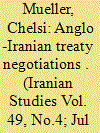

|
|
|
|
|
| Summary/Abstract |
From 1927 to 1932, wide-reaching negotiations took place between Reza Shah's court minister, ‘Abdolhossein Khan Teymurtash, and the British Legation in Tehran, the aim of which was to resolve all outstanding issues and to normalize relations between the two countries on the basis of a general treaty. This article examines these Anglo-Iranian negotiations with a particular focus on the thorniest issues—Iran's territorial claims in the Persian Gulf, particularly its claims to sovereignty over Bahrain, Abu Musa and the two Tunb islands. Though an agreement was never reached, an examination of the content and conduct of these negotiations offers some valuable insights into the unique features of Iranian nationalism and Iranian ambitions in the Persian Gulf during the Reza Shah period.
|
|
|
|
|
|
|
|
|
|
|
|
|
|
|
|
| 2 |
ID:
146783
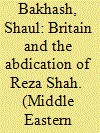

|
|
|
|
|
| Summary/Abstract |
On the eve of the Anglo-Soviet invasion of Iran in the Second World War, Sir Reader Bullard, the British minister in Tehran, urged on his government the desirability of removing the Iranian ruler, Reza Shah, from office. Association with the ‘universally detested’ shah, whom he described as a ‘greedy ignorant savage’, was detrimental to Britain's interests and its war effort. In the weeks that followed the Anglo-Soviet occupation of Iran, Bullard continued to press for and to shape the ultimate British decision to force Reza Shah to abdicate and go into exile. Yet, this was not always Bullard's view of Britain's relationship with the Iranian ruler. When he presented his credentials 20 months earlier, Bullard described it as his ‘urgent duty’ to win Reza Shah's favour. Nor did Bullard's insistence that Britain depose the Shah initially find favour with the Foreign Secretary, Anthony Eden, his Middle East staff at the Foreign Office, or with Churchill. This article traces the evolution of Bullard's own view of Reza Shah and the developments that led the Foreign Office, initially eager to win Reza Shah's favour and even ready to offer Reza Shah a ‘substantial bribe’ for his cooperation, to take steps to topple Reza Shah from the throne.
|
|
|
|
|
|
|
|
|
|
|
|
|
|
|
|
| 3 |
ID:
052809
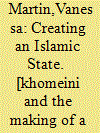

|
|
|
|
|
| Publication |
London, I B Tauris, 2003.
|
| Description |
xv, 248p.pbk
|
| Series |
Library of Modern Middle East Studies
|
| Standard Number |
1860649009
|
|
|
|
|
|
|
|
|
|
|
|
Copies: C:2/I:0,R:0,Q:0
Circulation
| Accession# | Call# | Current Location | Status | Policy | Location |
| 043634 | 955.053/MAR 043634 | Main | On Shelf | General | |
| 046644 | 955.053/MAR 046644 | Main | On Shelf | General | |
|
|
|
|
| 4 |
ID:
186547
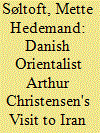

|
|
|
|
|
| Summary/Abstract |
This article focuses on Arthur Christensen's meeting with the Iranian intelligentsia in 1929. Arthur Christensen's L'Iran sous les Sassanides had a tremendous influence on the Iranian nationalism at the beginning of the twentieth century. However, Christensen's encounter with Iranian intellectuals in 1929 shows that from the very beginning they had much in common, and furthermore that Christensen was influenced by Iranian nationalism.
|
|
|
|
|
|
|
|
|
|
|
|
|
|
|
|
| 5 |
ID:
108752
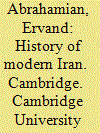

|
|
|
|
|
| Publication |
Cambridge, Cambridge University Press, 2008.
|
| Description |
xxviii, 228p.
|
| Standard Number |
9780521821391
|
|
|
|
|
|
|
|
|
|
|
|
Copies: C:1/I:0,R:0,Q:0
Circulation
| Accession# | Call# | Current Location | Status | Policy | Location |
| 056391 | 955.05/ABR 056391 | Main | On Shelf | General | |
|
|
|
|
| 6 |
ID:
037949
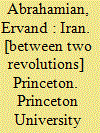

|
|
|
|
|
| Publication |
Princeton, Princeton University Press, 1982.
|
| Description |
xiii, 561p.: tables, figurehbk
|
| Series |
Princeton Studies on the Near East
|
| Standard Number |
0691052417
|
|
|
|
|
|
|
|
|
|
|
|
Copies: C:1/I:0,R:0,Q:0
Circulation
| Accession# | Call# | Current Location | Status | Policy | Location |
| 021655 | 954.05/ABR 021655 | Main | On Shelf | General | |
|
|
|
|
| 7 |
ID:
031864


|
|
|
|
|
| Publication |
New Delhi, Vikas Publishing House Pvt. Ltd., 1977.
|
| Description |
265p.Hbk
|
|
|
|
|
|
|
|
|
|
|
|
Copies: C:1/I:0,R:0,Q:0
Circulation
| Accession# | Call# | Current Location | Status | Policy | Location |
| 017032 | 923.155/KAR 017032 | Main | On Shelf | General | |
|
|
|
|
| 8 |
ID:
120857
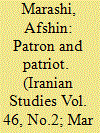

|
|
|
|
|
| Publication |
2013.
|
| Summary/Abstract |
This article examines the life and work of Dinshah Irani, a prominent Parsi scholar, lawyer and philanthropist who was a key intellectual intermediary between the Parsi community of Bombay and the intellectual community of Iranian nationalists during the 1920s and 1930s. The article details the role played by Irani in patronizing the publication of Zoroastrian-themed printed works in Bombay that were intended for export to the reading market in Iran. By focusing on the life and work of Dinshah Irani, the article details the important role the Parsi community of Bombay played in the revival of Iranian antiquity during the early twentieth century. The article also highlights the transnational cultural and intellectual history of Iranian nationalism during the Reza Shah period.
|
|
|
|
|
|
|
|
|
|
|
|
|
|
|
|
| 9 |
ID:
166641
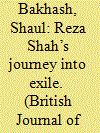

|
|
|
|
|
| Summary/Abstract |
On September 16, 1941, three weeks after British and Soviet troops invaded Iran in the Second World War and occupied the country, Reza Shah abdicated the throne in favor of his son, quit Iranian soil and boarded a British ship to go into exile. The British refused to allow Reza Shah to choose his own place of exile (South America) and sent him to the island of Mauritius. This article examines British thinking that resulted in the choice of Mauritius as the place of exile. It traces Reza Shah’s journey across Iran as he prepared to leave the country; details the composition of the large party of family and staff that accompanied him; provides an account of Reza’s Shah’s reminiscences and reflections at this difficult and emotion-laden moment when he was forced to surrender power, and describes the ‘stooped and aged man’ he had become. It ends with the arrival of the ship carrying Reza Shah and the royal party in Mauritius.
|
|
|
|
|
|
|
|
|
|
|
|
|
|
|
|
| 10 |
ID:
189068
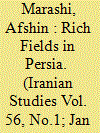

|
|
|
|
|
| Summary/Abstract |
This article investigates the history of economic relations between Iran and the Parsi community of India during the Reza Shah period. Encouraged by the policies of the new Pahlavi state, Parsi entrepreneurs began a serious effort to investigate the possibilities of economic investment in Iran. The article details three Parsi economic missions that were conducted in Iran during this period, and analyzes their assessments of Iran's potential for development in fields such as energy, textile manufacturing, commercial agriculture, and modern transportation systems. As the article argues, while these Parsi-led initiatives were part of a larger history of renewed engagement between Parsis and Iranians, for a variety of political and economic reasons, by the outbreak of World War II few of the Parsi plans for investment in Iran had come to fruition. While remaining largely forestalled in the interwar period, the article also suggests that Parsi economic assessments foreshadowed many of the planning strategies carried out in Iran's post–World War II history of economic development.
|
|
|
|
|
|
|
|
|
|
|
|
|
|
|
|
| 11 |
ID:
157839
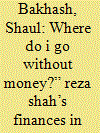

|
|
|
|
|
| Summary/Abstract |
When Reza Shah died in exile in Johannesburg, South Africa, in July 1944, he left in his account at Barclays Bank a deposit of £110,000, a considerable amount of money. Yet when he went into exile only three years earlier, Reza Shah feared he would be hard-pressed for money, if not left altogether destitute—and with good reason. He left Iran with a “horde” of progeny, family members and retainers. Before departing, he had ceded all his enormous wealth in cash and property to his son and successor. He did not remain destitute for long. His son, the new shah, continued to send him money, and for a while the British paid for a major part of his upkeep. Yet his money anxieties did not cease. This article describes and follows the winding trail of Reza Shah’s finances in exile.
|
|
|
|
|
|
|
|
|
|
|
|
|
|
|
|
|
|
|
|
|